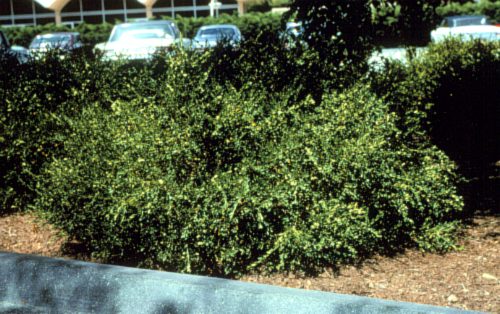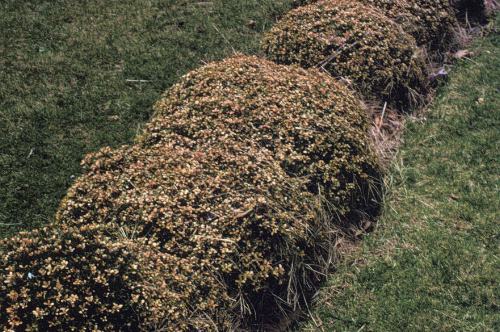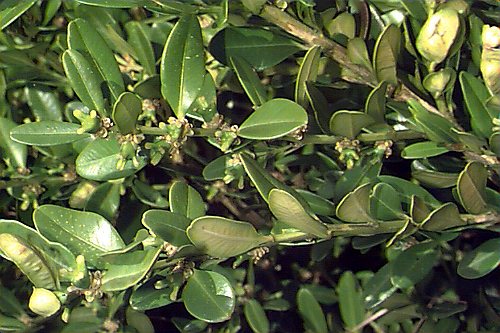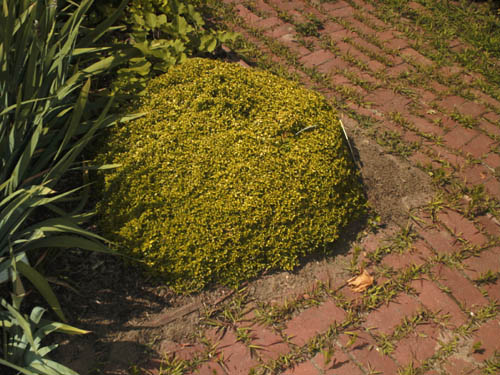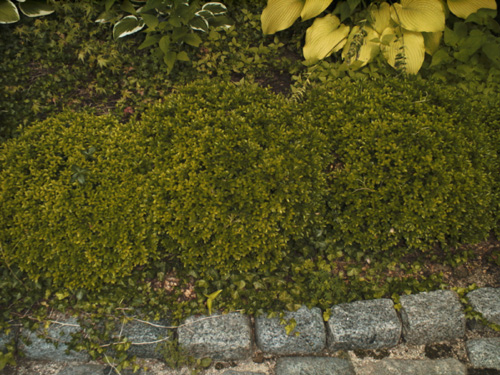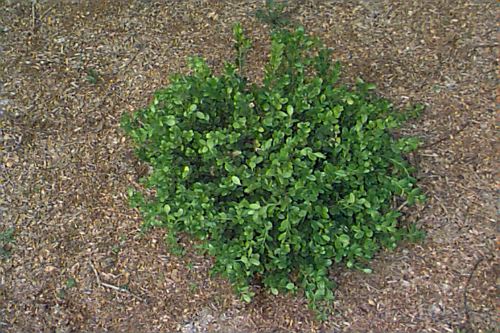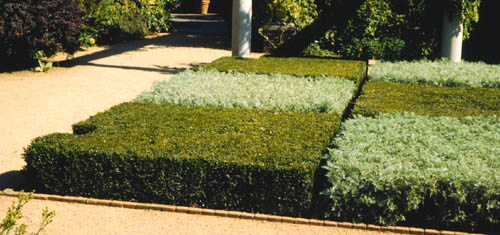Buxus microphylla
Littleleaf Box, Littleleaf Boxwood
Buxaceae
ExpandHabitat
- native to Japan
- zone 6, to zone 4 with proper cultivar selection
Habit and Form
- 3' to 4' tall with equal spread
- evergreen shrub with dense branching
- compact, rounded or broad habit
Summer Foliage
- opposite leaves, leathery
- 0.3 " to 1" ; long, approx. 0.25" wide
- leaf apex notched
- medium green color
- leaves broadest at or above the middle
Autumn Foliage
- foliage tends to turn yellow-green or brownish in fall and winter
- evergreen
Flowers
- male and female flowers
- blooms in April, but not showy
- fragrant and attractive to bees
Fruit
- insignificant 3-celled dehiscent capsule
Bark
- new stems green with square shape
- older stems become brown, but hidden by foliage
Culture
- prefers moist, cool soil with mulch around roots
- best in site with full sun or light shade, but protect from winter winds, sun and cold.
- tolerant of pruning
- provide newly planted shrubs with shade for best establishment
- best establishment form containers
- dislikes environmental extremes
- grows slowly
Landscape Use
- low hedge plantings
- foundation plant
- mass plantings
- exhibits good deer resistance
Liabilities
- lack of cold hardiness without proper selection of cultivars
- boxwood psyllid, boxwood leaf minor, boxwood mite, nematodes and phytophthora root rot can be problems
- foliar injury during harsh winters
- foliage turns an unpleasant yellow-green in the cold months, although newer selections are better at retaining dark green foliage
- slow growth; both a liability and an asset
ID Features
- opposite leaves distinguish it from Ilex crenata which has alternate leaves
- small elliptical or rounded leaves with notches in the apex
- distinctly square green stems
- dense growth, low habit, evergreen
- yellowish green leaf color in winter
- foliage has a distinct odor
Propagation
- cuttings root readily
Cultivars/Varieties
There are numerous cultivars, but the following discussion will be limited to selections with exceptional cold hardiness and/or good green winter foliage color.
var. koreana - An exceptionally cold hardy geographic variety which can take -20 to -25o F without significant injury. Unfortunately, its foliage turns an unpleasant yellow-green or brown in the cold winter months. Grows to 3' tall.
'Sunnyside' - Has large-sized leaves and exceptional cold hardiness. Fast growing to 6' by 6'. Foliage will bronze and yellow some in the winter.
'Winter Beauty' - A mounded form with dark green foliage. Requires little pruning. Will bronze in the winter, but its version of bonzing is considered to be attractive. A var. koreana selection.
'Winter Gem' - A var. koreana selection, growing to 4' tall and wide. Very similar to 'Winter Beauty' and may be a renamed cultivar.
'Wintergreen' - Has bright green leaf color and small leaves. Has performed well in cold climates. Leaves do not discolor in the winter. 2'-3' tall.
B. microphylla var. koreana x B. sempervirens hybrids - (Sheriden hybrids from Sheriden Nursery, Ontario, Canada) Possess cold hardiness of var. koreana and leaf color of sempervirens.
- 'Green Gem' - 2' by 2' mound or rounded ball
- 'Green Mountain' - wide oval form, upright 5' tall by 3' wide
- 'Green Mound' - 3' by 3' mounded habit
- 'Green Velvet' - 3' by 3' rounded habit
